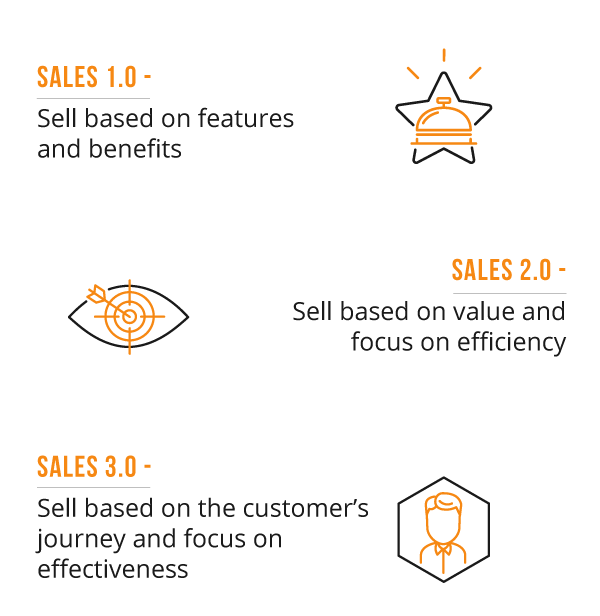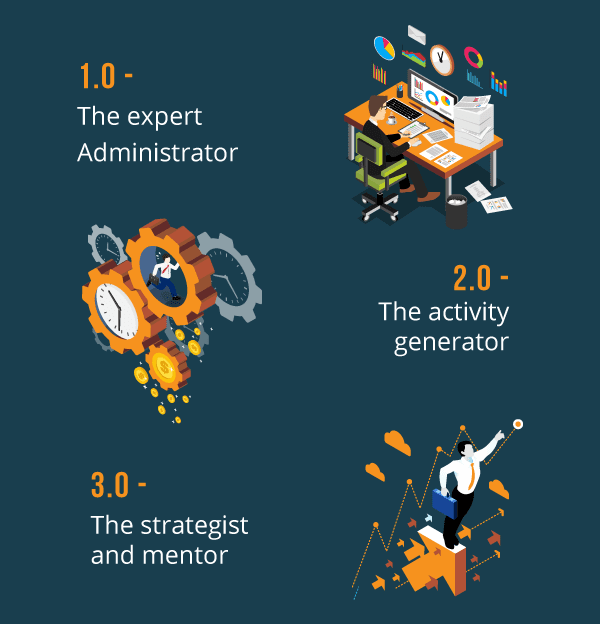 Sales managers are critical to the success of their sales reps. While sales managers are charged with ensuring reps meet their numbers, how they meet their numbers is not as simple as it once was. In the past, focusing in on pipeline and activities was the hallmark of a good sales manager, but the way customers purchase and reps sell has changed, and the role of sales managers has evolved as well.
Sales managers are critical to the success of their sales reps. While sales managers are charged with ensuring reps meet their numbers, how they meet their numbers is not as simple as it once was. In the past, focusing in on pipeline and activities was the hallmark of a good sales manager, but the way customers purchase and reps sell has changed, and the role of sales managers has evolved as well.
A highly successful sales manager now invests significant time in coaching their reps to improve their knowledge and skills, drive excellence in execution, and of course keep them on track. Yet businesses often under-invest in their sales managers. Harvard Business Review reported that only 12% of organizations currently invest sufficiently in the development of their frontline sales managers.
Sales managers have a difficult job and yet we often leave them to figure out things on their own.
While the
70/20/10 learning model
says that the majority of learning does happen on-the-job, for managers to develop they still need to receive their 10% of formal learning and 20% through coaching or mentoring. This model just doesn’t work anymore. If we leave our sales managers to work out what they’re doing on their own it may take them years to get it right. Can your sales reps wait that long?
In this day and age that’s simply not good enough. The role of sales is rapidly evolving and we expect much more of our sales reps, so it naturally follows that their leaders also need to evolve.


As we move into the era of Sales 3.0, we’re constantly looking for new ways to help our sales reps adapt to the changing world order. This search should start with taking a good look at the sales managers to make sure they have the skills and tools they need to lead their reps through this change. The time has come for organizations to retire Sales Manager 1.0 and Sales Manager 2.0, and set about enabling Sales Manager 3.0.
Sales Manager 2.0 is no longer compatible with Sales 3.0
Sales Manager 1.0: The expert administrator
- Manages sales and administrative tasks
- Dealing with complaints or individual issues with sales reps
- Executives performance management
- Gives feedback on individual issues
- Responds to queries by sales leaders
Sales Manager 2.0: The activity generator
- Undertakes the same activities as Sales Manager 1.0
plus
- Leverages email automation tools to improve productivity
- Relies on scaling customer communications to broaden the reach
- Focuses on a high turnover with power dialers and other productivity tools
Sales Manager 3.0: The strategist and mentor
- Manages sales reps
- Ensures execution of account and territory strategies
- Helping sales reps create business
- Developing and executing customer-management strategies
- Coaches and mentors reps using a structured approach to improve performance and behaviors
- Supports executives to make strategic decisions about a sales organization
- Forecasting
- Funnel management
So how do you get your Sales Manager 2.0 to Sales Manager 3.0
The key is to plan your approach and enable your sales managers to perform at their best. Here are four steps to transform your sales managers.
1. Define their role
Sales management is rarely a one-size-fits-all role. In most organizations there are several sales management roles; for example inside sales managers, field sales managers, territory managers. Each of these roles has different responsibilities and requires different skills.
Before you can determine what your sales managers need to be enabled on, their role needs to be clearly defined. In this step, outline the parameters of each role and what they are expected to achieve. This sets the basis for the next step.
2. Determine the skills required for each role
Once the role of each sales manager in your organization is defined you can then determine what skills are required to perform the roles effectively. As part of this process, it’s essential to consider the behaviors and activities that your managers need to demonstrate to be successful in their role. Questions you can ask include:
- Do they know how to focus on their team over their individual performance? Many sales managers are promoted from the field where they were judged on their own performance. Making the mental shift to focusing on the performance of the collective can be challenging for some.
- Do they know how the business of sales runs? Forecasting, reporting, sales methodologies, and processes; these are all skills that are fundamental to leading a successful sales team.
- Do they know how to create an effective sales strategy? Stepping back and mapping out the big picture is essential to Sales Manager 3.0. This requires being able to identify skill gaps and understanding how these can be plugged and their reps’ skills developed over time.
- How much experience have they had leading people? A core skill for any sales manager is leading people. This covers more than just hiring and monitoring their quotas. Leading a sales team involves identifying and developing skills as well as coaching and mentoring.
- Do they know what to coach on and how to do it? Coaching is much more than just giving feedback to reps about how they performed in a meeting. It covers all aspects of selling from lead identification to how they close the deal.
- Do they know how to mentor individuals? Mentoring is different from coaching. It’s about guiding and providing advice to help reps develop their own skills. This is a skill that can be difficult for anyone to learn, yet it’s crucial to the success of Sales Manager 3.0.
- Do they know what success looks like? Meeting quota is no longer the only indicator of a sales reps’ success. It’s important that sales managers not only understand what success looks like for their reps but also what it means in terms of their own role, so they can then build their own skill gaps if necessary.
3. Identify where the skill gaps are
Once you know what skills your sales managers require to perform their jobs effectively you can then overlay their existing skills to help you identify areas where they require improvement or development.
A useful tool to help identify areas where your sales managers may require development is by looking at your
efficiency and sales effectiveness indicators
. These metrics focus in on the areas that are important to sales managers when looking at the progress of their reps. So it makes sense that they need to be able to drive the behaviors and capabilities that will drive these indicators in the right direction.
For example, if your reps are struggling in their elevator pitches then they need support from their managers to improve. This requires managers to coach them on improving their messaging and pitch skills. So it follows that your managers may require some help bringing their coaching skills in these areas up to the mark.
4. Leverage technology to enable your sales managers
Just like your sales stack helps your reps perform at their best, your sales managers need a technology stack of their own. This goes beyond your CRM and really hones in on helping them perform each of the elements of their role better. Their stack can borrow from the existing sales stack and also leverage tools from other parts of the organization. The sales managers stack may include:
- Hiring: To improve their hiring process consider tools that help test candidates for sales aptitude and competency.
- Coaching: Sales readiness platforms can help optimize coaching by establishing a formal framework that helps managers identify skill gaps and then focus on remediation by developing reps’ skills. This should incorporate a range of coaching activities including role plays, so managers can focus in on specific skills.
- Messaging: Video and audio tools can often be found in sales readiness platforms. These can help reps practice their messaging and get feedback, not only from their managers but also from other subject matter experts, on how they articulate their value proposition in different situations.
- Forecasting: Tools like your CRM can help your managers accurately forecast sales results, so they can identify issues early and act quickly when necessary.
- Managing: This can include the basics of management, like how to motivate their team or conduct performance reviews. If your sales managers have never led a team before then the basics are essential to learning.
These tools will help you enable your sales managers, but the key focus shouldn’t be on helping take your sales managers to the next level. After all, they play an integral role in the overall sales success of your business. But it’s important to remember that enablement isn’t a set and forget exercise. Once you’ve built Sales Manager 3.0 it will almost certainly be time to start working on the next model.








